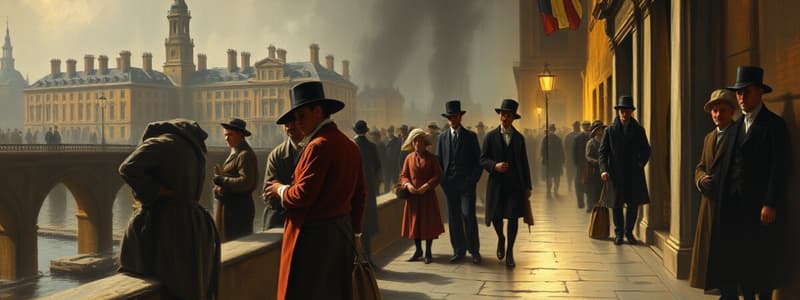Podcast
Questions and Answers
What was the primary purpose of workhouses in 1800s England?
What was the primary purpose of workhouses in 1800s England?
- To serve as a place for recreation
- To train skilled workers for factories
- To provide education to children
- To offer shelter and sustenance to the poorest (correct)
What was Oliver Twist’s experience like at the orphanage compared to the workhouse?
What was Oliver Twist’s experience like at the orphanage compared to the workhouse?
- The orphanage provided no food, unlike the workhouse
- He was happier at the workhouse than at the orphanage
- He felt isolated and unhappy at the workhouse (correct)
- He made many friends at the workhouse
Who did Oliver meet that helped him navigate to London?
Who did Oliver meet that helped him navigate to London?
- Fagin
- Jack Dawkins (correct)
- The nurse
- Another orphan
What activity did Fagin instruct Oliver and the other boys to engage in?
What activity did Fagin instruct Oliver and the other boys to engage in?
What was the common condition of the boys at the workhouse?
What was the common condition of the boys at the workhouse?
What tragic event occurred to Oliver's mother when he was born?
What tragic event occurred to Oliver's mother when he was born?
What did Dickens believe was the best escape from poverty?
What did Dickens believe was the best escape from poverty?
Which schools did Dickens support that catered to poor children?
Which schools did Dickens support that catered to poor children?
What is a common theme found in Dickens' novels?
What is a common theme found in Dickens' novels?
Which of the following novels was not written by Charles Dickens?
Which of the following novels was not written by Charles Dickens?
What impact did Dickens' success as a writer have on his ability to help the poor?
What impact did Dickens' success as a writer have on his ability to help the poor?
In Dickens' view, how were the lives of the poor often treated in society?
In Dickens' view, how were the lives of the poor often treated in society?
What significant event happened to Dickens when he was 12 years old?
What significant event happened to Dickens when he was 12 years old?
How did Dickens' experience in the factory influence his writing career?
How did Dickens' experience in the factory influence his writing career?
What prompted Dickens to return to school after working in the factory?
What prompted Dickens to return to school after working in the factory?
What was the public's reaction to the publication of Oliver Twist?
What was the public's reaction to the publication of Oliver Twist?
Which of the following did Dickens NOT experience directly in his youth?
Which of the following did Dickens NOT experience directly in his youth?
What societal issue did Dickens strongly believe was related to poverty?
What societal issue did Dickens strongly believe was related to poverty?
What motivated Dickens to write about the poor in London?
What motivated Dickens to write about the poor in London?
What was one of Dickens' first jobs after leaving school?
What was one of Dickens' first jobs after leaving school?
Flashcards are hidden until you start studying
Study Notes
Life in the 1800s England
- Rapid urbanization saw many poor people moving to cities for work opportunities.
- Workhouses were established for the destitute, providing living arrangements, work, and meals.
- Conditions in workhouses were harsh; inhabitants experienced subsistence living, often struggling to stay warm.
Oliver Twist's Early Life
- A woman arrived at a workhouse, gave birth to Oliver Twist, and subsequently died.
- After birth, Oliver was placed in an orphanage until the age of nine.
- Leaving the orphanage for a workhouse left Oliver sorrowful, as he lost his sense of belonging with fellow orphans.
Experience in the Workhouse
- At the workhouse, Oliver encountered malnutrition and a desolate environment shared by other boys.
- Encouraged by peers, Oliver attempted to ask for more food, inciting anger from workhouse managers.
- Faced with despair, he decided to escape and journeyed to London, endured hunger for several days.
Arrival in London
- In London, Oliver met Jack Dawkins, who guided him into the city.
- Jack introduced Oliver to Fagin, an old man who provided food and shelter.
Life with Fagin
- Oliver noticed other boys gathering at Fagin's house to present stolen items like watches and jewelry.
- Introduced to a life of thievery, Oliver witnessed the boys pickpocketing people, realizing their criminal activities.
Charles Dickens' Early Life
- Charles Dickens began in a comfortable environment with a good education.
- At age 12, Dickens’ life changed dramatically when his father was imprisoned for debt.
- He worked in a factory labeling bottles, earning very little and experiencing hardship.
- The factory work exposed him to the struggles of poor people, shaping his compassionate outlook as a writer.
Transition to Writing Career
- After his father's release, Dickens returned to school, but his passion for writing was evident.
- Initially worked in the legal field but transitioned to journalism, where he began writing popular stories.
- His writing often highlighted societal issues, specifically relating to poverty.
Impact of Poverty on His Work
- Dickens lived near a workhouse, witnessing the plight of malnourished children, inspiring his novel Oliver Twist.
- Oliver Twist depicted the harsh realities faced by children in workhouses and the streets of London.
- These stories were serialized in magazines, shocking readers with their basis in reality and highlighting hidden poverty.
Views on Poverty and Education
- While sympathetic to the poor, Dickens believed poverty led to crime, exemplified by characters like Fagin in Oliver Twist.
- Advocated for education as a primary escape route from poverty; he personally benefitted from returning to school after his early hardships.
Contributions and Legacy
- Supported Ragged Schools that provided education to impoverished children.
- His notable works include Nicholas Nickleby (1839), David Copperfield (1850), and Great Expectations (1861).
- Dickens’ novels often blend humor with social critique, mocking those who value status and wealth.
- His stories remain popular today and have been adapted into numerous films, emphasizing the ongoing relevance of his themes regarding poverty.
Studying That Suits You
Use AI to generate personalized quizzes and flashcards to suit your learning preferences.




